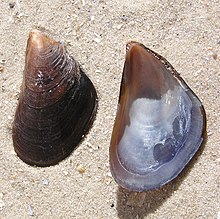Due the increase of carbon dioxide in the atmosphere because of humans, the ocean is becoming more acidic. This is bad since it is hurting ecosystems and their biodiversity since it is killing many marine animals and plant. For example, the mytilus galloprovincialis is an adaptable, invasive species that cannot be found in acidic waters. Acidification has already played a part in a few mass extinctions so I wonder if it will play a part again since it seems like carbon dioxide levels will not drop any time soon so the ocean will become more acidic. Some species will be able to grow, but others will go extinct which can throw off the balance in the ocean since if a certain species dies they will not be able to keep another species in check.
Wednesday, August 29, 2018
Chapter Six (Sarah)
Due the increase of carbon dioxide in the atmosphere because of humans, the ocean is becoming more acidic. This is bad since it is hurting ecosystems and their biodiversity since it is killing many marine animals and plant. For example, the mytilus galloprovincialis is an adaptable, invasive species that cannot be found in acidic waters. Acidification has already played a part in a few mass extinctions so I wonder if it will play a part again since it seems like carbon dioxide levels will not drop any time soon so the ocean will become more acidic. Some species will be able to grow, but others will go extinct which can throw off the balance in the ocean since if a certain species dies they will not be able to keep another species in check.
Subscribe to:
Post Comments (Atom)
Chapter 4 Armando Peralta
Chapter 4 builds off of the concepts that chapter 2 and Chapter 3 discussed by describing a scientists attempt to prove the most popular ext...

-
Elizabeth Kolbert starts chapter 9 by talking about her trip to Reserve 1202 in the Brazilian state of Amazonas. She describes ...
-
In chapter 9 of the book, Kolbert talks about the Biological Dynamics of Forest Fragments or BDFPP, founded by Thomas Lovejoy. This ...
-
In chapter 13, Elizabeth Kolbert goes to the Institute for Conservation Research near the San Diego Zoo. Researcher Marly Houck...

No comments:
Post a Comment